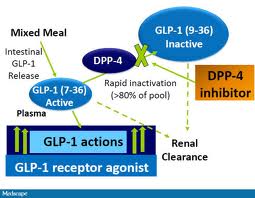

Postmarketing reports of pancreatitis and pancreatic cancer in patients taking certain antidiabetic medications has been a matter of great concern. Both the U.S. Food and Drug Administration (FDA) and the European Medicines Agency (EMA) have extensively reviewed nonclinical toxicology studies, clinical trial data, and epidemiologic data pertaining to blood glucose–lowering drug products (e.g., exenatide and sitagliptin) that stimulate postprandial insulin release by potentiating the incretin hormone pathways to check for any relationship.

Clinical safety databases reviewed by the FDA included data from more than 200 trials, involving approximately 41,000 participants, more than 28,000 of whom were exposed to an incretin-based drug; 15,000 were exposed to drug for 24 weeks or more, and 8500 were exposed for 52 weeks or more. A similar review was conducted by the EMA, including all studies performed with the incretin-based drugs authorized in the European Union.
Two cardiovascular outcome trials in patients with type 2 diabetes who were treated with incretin-based drugs have been reviewed : the Saxagliptin Assessment of Vascular Outcomes Recorded (SAVOR) trial and the Examination of Cardiovascular Outcomes with Alogliptin versus Standard of Care (EXAMINE) trial.

Both agencies agree that assertions concerning a causal association between incretin-based drugs and pancreatitis or pancreatic cancer, as expressed recently in the scientific literature and in the media, are inconsistent with the current data.

The FDA and the EMA have not reached a final conclusion at this time regarding such a causal relationship. Although the totality of the data that have been reviewed provides reassurance, pancreatitis will continue to be considered a risk associated with these drugs until more data are available. Ongoing strategies include systematic capture of data on pancreatitis and pancreatic cancer from cardiovascular outcome trials and ongoing clinical trials, which should facilitate meta-analyses, and accumulation of further knowledge regarding these signals in the future.

 Postmarketing reports of pancreatitis and pancreatic cancer in patients taking certain antidiabetic medications has been a matter of great concern. Both the U.S. Food and Drug Administration (FDA) and the European Medicines Agency (EMA) have extensively reviewed nonclinical toxicology studies, clinical trial data, and epidemiologic data pertaining to blood glucose–lowering drug products (e.g., exenatide and sitagliptin) that stimulate postprandial insulin release by potentiating the incretin hormone pathways to check for any relationship.
Postmarketing reports of pancreatitis and pancreatic cancer in patients taking certain antidiabetic medications has been a matter of great concern. Both the U.S. Food and Drug Administration (FDA) and the European Medicines Agency (EMA) have extensively reviewed nonclinical toxicology studies, clinical trial data, and epidemiologic data pertaining to blood glucose–lowering drug products (e.g., exenatide and sitagliptin) that stimulate postprandial insulin release by potentiating the incretin hormone pathways to check for any relationship.